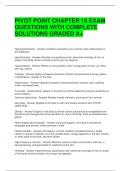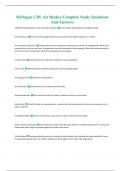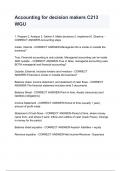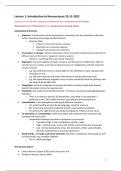Methodology for CIS: Qualitative
research methods - Key concepts
Inhoudsopgave
1 - The arc of naturalistic inquiry................................................2
2 - On naturalistic inquiry: Key issues and practices....................2
3 – Theorizing society: Grounded theory in naturalistic inquiry.....4
4 – Looking at society: Observing, participating, interpreting.......4
6 – Talking about society: Interviewing and casual conversation...6
7 – Reading society: Texts, images, and things. – Not getting lost
in society: On qualitative analysis..............................................7
“They're just, like, there”: A constructivist grounded theory study
of student experiences with school resource officers...................8
Summary.........................................................................................8
Key concepts applied to the study....................................................9
1
, 1 - The arc of naturalistic inquiry
Naturalistic inquiry = Research approach that seeks to understand
phenomena in their natural settings without artificial constraints.
Arc (of naturalistic inquiry) = The overall trajectory of naturalistic research,
including immersion, data collection, analysis, interpretation, and
dissemination.
Empirical cycle (spiral) = A continuous process of observation, hypothesis
formation, testing, and refinement, represented as a spiral to indicate the
iterative progress.
Reflexive understanding = Critically examining one’s biases and
assumptions through the research process to enhance awareness of
personal influence.
Iterative research = Cyclical process of refining research through repeated
data collection, analysis, and interpretation. A flexible and responsive way
to emerging insights.
Qualitative research = Research that focuses on understanding through
non-numerical data and emphasizes context, meaning, and subjective
experiences.
2 - On naturalistic inquiry: Key issues and
practices
Interpretivism = Focuses on understanding subjective meanings and
intentions in social phenomena.
Positivism = Seeks objective truths through empirical observation and
scientific methods.
Quantitative = Research that involves numerical data collection and
statistical analysis (opposite of qualitative).
Validity = Reflects the accuracy of research findings in measuring what
they claim to measure.
Reliability = Indicates the consistency of research results over repeated
measurements.
Verstehen = Empathetic understanding from the perspective of those who
are being studied.
2
research methods - Key concepts
Inhoudsopgave
1 - The arc of naturalistic inquiry................................................2
2 - On naturalistic inquiry: Key issues and practices....................2
3 – Theorizing society: Grounded theory in naturalistic inquiry.....4
4 – Looking at society: Observing, participating, interpreting.......4
6 – Talking about society: Interviewing and casual conversation...6
7 – Reading society: Texts, images, and things. – Not getting lost
in society: On qualitative analysis..............................................7
“They're just, like, there”: A constructivist grounded theory study
of student experiences with school resource officers...................8
Summary.........................................................................................8
Key concepts applied to the study....................................................9
1
, 1 - The arc of naturalistic inquiry
Naturalistic inquiry = Research approach that seeks to understand
phenomena in their natural settings without artificial constraints.
Arc (of naturalistic inquiry) = The overall trajectory of naturalistic research,
including immersion, data collection, analysis, interpretation, and
dissemination.
Empirical cycle (spiral) = A continuous process of observation, hypothesis
formation, testing, and refinement, represented as a spiral to indicate the
iterative progress.
Reflexive understanding = Critically examining one’s biases and
assumptions through the research process to enhance awareness of
personal influence.
Iterative research = Cyclical process of refining research through repeated
data collection, analysis, and interpretation. A flexible and responsive way
to emerging insights.
Qualitative research = Research that focuses on understanding through
non-numerical data and emphasizes context, meaning, and subjective
experiences.
2 - On naturalistic inquiry: Key issues and
practices
Interpretivism = Focuses on understanding subjective meanings and
intentions in social phenomena.
Positivism = Seeks objective truths through empirical observation and
scientific methods.
Quantitative = Research that involves numerical data collection and
statistical analysis (opposite of qualitative).
Validity = Reflects the accuracy of research findings in measuring what
they claim to measure.
Reliability = Indicates the consistency of research results over repeated
measurements.
Verstehen = Empathetic understanding from the perspective of those who
are being studied.
2










